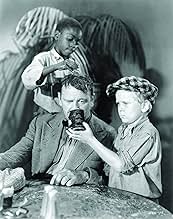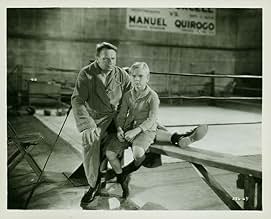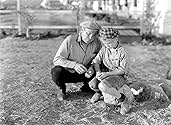IMDb RATING
7.2/10
3.9K
YOUR RATING
An alcoholic ex-boxer struggles to provide a good living for his son.An alcoholic ex-boxer struggles to provide a good living for his son.An alcoholic ex-boxer struggles to provide a good living for his son.
- Won 2 Oscars
- 5 wins & 3 nominations total
Roscoe Ates
- Sponge
- (as Rosco Ates)
Dannie Mac Grant
- Boy Taunting Dink
- (uncredited)
Frank Hagney
- Manuel Quiroga - Mexican Champ
- (uncredited)
Dell Henderson
- The Doctor
- (uncredited)
Tom McGuire
- Los Angeles Promoter
- (uncredited)
Walter Percival
- Los Angeles Promoter
- (uncredited)
Lee Phelps
- Louie - the Bartender
- (uncredited)
Andy Shuford
- Boy at Racetrack
- (uncredited)
Dan Tobey
- Ring Announcer
- (uncredited)
Featured reviews
'The Champ' seems to have been a blueprint film for all the others of the tough-tender school that followed it, and - owing entirely to Jackie Cooper's playing perfectly off of Wallace Beery's has-been, alcoholic pug - it's perfectly charming.
Yes, the fight scene is rather hokey: had they tried to use Wallace Beery's telegraphed-the-day-before roundhouse punches, even the toe-to-toe sluggers of 'The Champ's bygone day wouldn't have survived one round in the ring. But the film isn't about the fight scene, it's about the love of father for son and son for father - and to this day 'The Champ's' story artfully delivers its soft knock-out blow with tender sucker punches and love-taps to the heart.
Compared with today's fare 'The Champ's' pacing is slow but the time taken works nicely, especially in the one-on-one scenes captivatingly played by Cooper and Beery.
There's plenty of archetypal King Vidor composition-in-frame that's still imitated today, and in many instances the lighting is exemplary of the gorgeous black & white textural artistry of Hollywood's Golden Age. Lovers of classic B&W work might want to grab more than a few frames from the DVD.
Beery's work is quite good here, but Jackie Cooper's remarkable, potent chops steal the show - and your heart; though 'The Champ' has a good many fine, classical attributes there's none better in it than Cooper's unforgettable performance.
Yes, the fight scene is rather hokey: had they tried to use Wallace Beery's telegraphed-the-day-before roundhouse punches, even the toe-to-toe sluggers of 'The Champ's bygone day wouldn't have survived one round in the ring. But the film isn't about the fight scene, it's about the love of father for son and son for father - and to this day 'The Champ's' story artfully delivers its soft knock-out blow with tender sucker punches and love-taps to the heart.
Compared with today's fare 'The Champ's' pacing is slow but the time taken works nicely, especially in the one-on-one scenes captivatingly played by Cooper and Beery.
There's plenty of archetypal King Vidor composition-in-frame that's still imitated today, and in many instances the lighting is exemplary of the gorgeous black & white textural artistry of Hollywood's Golden Age. Lovers of classic B&W work might want to grab more than a few frames from the DVD.
Beery's work is quite good here, but Jackie Cooper's remarkable, potent chops steal the show - and your heart; though 'The Champ' has a good many fine, classical attributes there's none better in it than Cooper's unforgettable performance.
Yes we've seen it thousands of times, but each time is a wonderful experience. You know the story by heart, but you discover new things again and again. This film is King Vidor in all his glory. Fantastic photography, great shots. For a film of 1931, it's crazy how the image remains beautiful.
The story is gripping and the acting is superb even though at times over the top.
Deserves to be shown and watched again and again.
this is one touching,heartwarming movie.it's all about the love a father has for his son and vice versa.Wallace Beery is good as the dad,but it's Jackie Cooper(nine years old,at the time)who steals the show)as the son.as a nine year old child,Cooper showed acting ability and maturity way beyond his years.this film has little to do with boxing,and in fact,the one big boxing scene is quite comical,and not in a good way.thank goodness,it secondary,and doesn't lesson the overall impact of the movie.the ending is unexpected and hit me like a punch to the gut.it's a powerful moment,and deeply affecting.for me,The Champ(1931)is a 7/10
10Steffi_P
In the worst years of the depression, the most popular stars were not the most glamorous or attractive. As revealed in the highly respected Quigley poll (which surveyed movie theatre owners on who their audiences were most likely to come and see), the biggest draws in the early 30s were friendly, earthy types whom audiences could relate to at a time of poverty and desperation. These included genial comic Will Rogers, middle-aged frump Marie Dressler, and burly pug-face Wallace Beery, who played his greatest role in 1931 feature The Champ.
Beery's physique meant he was often cast as villainous thugs, but he had demonstrated enough acting prowess to get a decent number of "gentle giant" lead roles. In The Champ he gets to combine the two, one minute the swaggering pugilist, the next a devoted father. He gives a performance full of tiny gestures, expertly dancing from one expression to another. When he gets to show his character's emotional vulnerability, the scene is doubly poignant coming after the macho confidence he normally displays. The knowledge that off the set Beery was reputedly a wife-beating brute who bullied everyone around him perhaps spoils the effect slightly, but even with this in mind his performance is captivating, believable and utterly flawless.
Supporting Beery behind the camera is a director who was both a poet and a craftsman of the cinema – King Vidor. Vidor excelled at coaxing naturalism from his players at a time when theatrical hamming was the par. His camera focuses on Beery for long takes, allowing the actor to potter about doing his little bits of business and developing the character. Vidor also gives the picture bite with some neat tracking shots. These are usually in the field of depth, so in other words we are either backing away from the actors or following them. The former kind, with the players advancing on the camera as in the shot that opens the picture, gives the characters presence and show them as a force to be reckoned with. The latter kind, where the camera follows the character, physically pulls us into their world. Vidor used these kinds of shot a lot, and they are a neat way of making the audience feel involved without drawing too much attention to the artificiality of the form.
It may come as a surprise that this story of male bonding was written by a woman, Frances Marion. But like Beery, Marion defied expectations simply by being very good at what she did. Her plot for The Champ earned her the second of her two Oscars. It does not perhaps describe the most realistic of situations, but the emotional content is very sincere, and its depiction of determination and human feeling during hard times must have struck a chord with audiences of the day. The dialogue, which is credited to three separate people, is appropriately punchy with lines that sound believable yet are memorable and evocative.
Aside from Beery, the rest of the cast are a good bunch. Of all the lead players, Irene Rich is the only one who doesn't stand out, and she seems simply there to fill the wealthy, motherly type. But having said that she is not at all bad and her presence doesn't harm the picture. The Champ also sees Roscoe Ates in one of his largest roles, and for once getting to appear as a normal person rather than the stuttering fool he was usually required to play. Finally there is Jackie Cooper, one of the greatest child stars of his or indeed any era. While it seems clear that fame has gone to the youngster's head (he's not quite as good as he thinks he is), he is certainly up to the task of carrying his end of the picture. He plays a genuine child when with Beery, but when he is around others he deepens his voice and adopts mannerisms as if trying to be an adult. It's a touching and appropriate performance and very suited to the tone of the picture. And this was perhaps also the only time in which a child actor like Cooper could become a personality in his own right. As the popularity of Beery, Dressler et al proves, this was the age of the unconventional superstar.
Beery's physique meant he was often cast as villainous thugs, but he had demonstrated enough acting prowess to get a decent number of "gentle giant" lead roles. In The Champ he gets to combine the two, one minute the swaggering pugilist, the next a devoted father. He gives a performance full of tiny gestures, expertly dancing from one expression to another. When he gets to show his character's emotional vulnerability, the scene is doubly poignant coming after the macho confidence he normally displays. The knowledge that off the set Beery was reputedly a wife-beating brute who bullied everyone around him perhaps spoils the effect slightly, but even with this in mind his performance is captivating, believable and utterly flawless.
Supporting Beery behind the camera is a director who was both a poet and a craftsman of the cinema – King Vidor. Vidor excelled at coaxing naturalism from his players at a time when theatrical hamming was the par. His camera focuses on Beery for long takes, allowing the actor to potter about doing his little bits of business and developing the character. Vidor also gives the picture bite with some neat tracking shots. These are usually in the field of depth, so in other words we are either backing away from the actors or following them. The former kind, with the players advancing on the camera as in the shot that opens the picture, gives the characters presence and show them as a force to be reckoned with. The latter kind, where the camera follows the character, physically pulls us into their world. Vidor used these kinds of shot a lot, and they are a neat way of making the audience feel involved without drawing too much attention to the artificiality of the form.
It may come as a surprise that this story of male bonding was written by a woman, Frances Marion. But like Beery, Marion defied expectations simply by being very good at what she did. Her plot for The Champ earned her the second of her two Oscars. It does not perhaps describe the most realistic of situations, but the emotional content is very sincere, and its depiction of determination and human feeling during hard times must have struck a chord with audiences of the day. The dialogue, which is credited to three separate people, is appropriately punchy with lines that sound believable yet are memorable and evocative.
Aside from Beery, the rest of the cast are a good bunch. Of all the lead players, Irene Rich is the only one who doesn't stand out, and she seems simply there to fill the wealthy, motherly type. But having said that she is not at all bad and her presence doesn't harm the picture. The Champ also sees Roscoe Ates in one of his largest roles, and for once getting to appear as a normal person rather than the stuttering fool he was usually required to play. Finally there is Jackie Cooper, one of the greatest child stars of his or indeed any era. While it seems clear that fame has gone to the youngster's head (he's not quite as good as he thinks he is), he is certainly up to the task of carrying his end of the picture. He plays a genuine child when with Beery, but when he is around others he deepens his voice and adopts mannerisms as if trying to be an adult. It's a touching and appropriate performance and very suited to the tone of the picture. And this was perhaps also the only time in which a child actor like Cooper could become a personality in his own right. As the popularity of Beery, Dressler et al proves, this was the age of the unconventional superstar.
Probably the greatest disconnect among film personalities in history is that of Wallace Beery. On the screen he played these lovable oaf types, even when he was a bad guy. Off the screen he was a violent man, given to fits of temper and I can't recall anyone having a good word to say about him. Possibly for that reason Beery could lay claim to the fact he was the greatest actor in films. The crowning achievement of his career was his Oscar winning performance in The Champ.
Of course Beery could not have done it without little Jackie Cooper as well. It's their scenes together that make the film as memorable as it is. Instead of splitting the Academy Award with Fredric March who was also awarded The Best Actor for Dr. Jekyll and Mr. Hyde, possibly Beery should have given half of his half to Cooper.
Beery is actually a former champ in this film. He's an over the hill, alcoholic pug who lives a hand to mouth existence with his young son Cooper. He split from his wife Irene Rich years ago, taking Cooper and she'd like to get him back. She's pretty well fixed now with a new and rich husband and a daughter by that marriage.
The fly in the ointment is that Cooper is really attached to his father and blind to the faults he has. And Beery really does love his son, the only really happy part about his life. He's probably way too old to be seriously in the fight game, but he needs the dough for his kid.
The Champ is guaranteed four handkerchief film even now almost eighty years after its debut. A remake was done in 1979 with Jon Voight and Rick Schroder in the main two roles, but it wasn't a patch on this one.
Of course Beery could not have done it without little Jackie Cooper as well. It's their scenes together that make the film as memorable as it is. Instead of splitting the Academy Award with Fredric March who was also awarded The Best Actor for Dr. Jekyll and Mr. Hyde, possibly Beery should have given half of his half to Cooper.
Beery is actually a former champ in this film. He's an over the hill, alcoholic pug who lives a hand to mouth existence with his young son Cooper. He split from his wife Irene Rich years ago, taking Cooper and she'd like to get him back. She's pretty well fixed now with a new and rich husband and a daughter by that marriage.
The fly in the ointment is that Cooper is really attached to his father and blind to the faults he has. And Beery really does love his son, the only really happy part about his life. He's probably way too old to be seriously in the fight game, but he needs the dough for his kid.
The Champ is guaranteed four handkerchief film even now almost eighty years after its debut. A remake was done in 1979 with Jon Voight and Rick Schroder in the main two roles, but it wasn't a patch on this one.
Did you know
- TriviaWallace Beery actually got one less vote than Fredric March in the 1931/1932 Academy Awards voting for best actor, but the rules at the time considered anyone with one or two votes less than the leader as being in a tie. So both got Academy Awards.
- GoofsAs Dink plays on the balcony awaiting his meeting with Linda, he steals chewing gum and candy for himself off of a table on the balcony. He then steals the contents of a box of cigarettes, saying that he'll "bring some home for the Champ", and stuffs them into his right jacket pocket. However, during the ride home, Andy reaches into Dink's right jacket pocket and finds cigars rather than the cigarettes which we clearly saw Dink steal.
- Quotes
[Dink compares the swanky home to his own]
Dink Purcell: The Champ and I ain't fixed up swell as this, but our joint's more lively.
- ConnectionsEdited into The Our Gang Story (1994)
- SoundtracksThe Monkeys Have No Tails in Pago Pago
(uncredited)
Composer uncertain
Sung a cappella by Wallace Beery
- How long is The Champ?Powered by Alexa
Details
- Runtime
- 1h 26m(86 min)
- Color
- Aspect ratio
- 1.20 : 1
Contribute to this page
Suggest an edit or add missing content










































